Introduction
HR chatbots have become indispensable tools for modern recruitment and onboarding processes.
Central to their success is their ability to ask the right HR chatbot questions. These recruitment chatbot questions streamline pre-screening, enhance communication, and simplify onboarding processes.
The targeted HR chatbot questions save time and ensure that candidates receive a seamless and personalized experience.
A well-crafted HR chatbot questions and answers dataset forms the backbone of effective HR chatbots. It provides a repository of predefined questions and answers that cover everything from company policies to role-specific details.
These HR chatbot questions and answers dataset help gather essential details, filter applicants, and guide new hires through their first steps in the organization. It improves efficiency and creates a positive impression on candidates.
This guide explores 10 essential questions every HR chatbot should ask to optimize employee screening and onboarding processes.
Building an HR Chatbot Question and Answer Dataset
A well-designed HR chatbot can simplify screening and onboarding. To work effectively, it needs a strong foundation: a well-structured dataset.
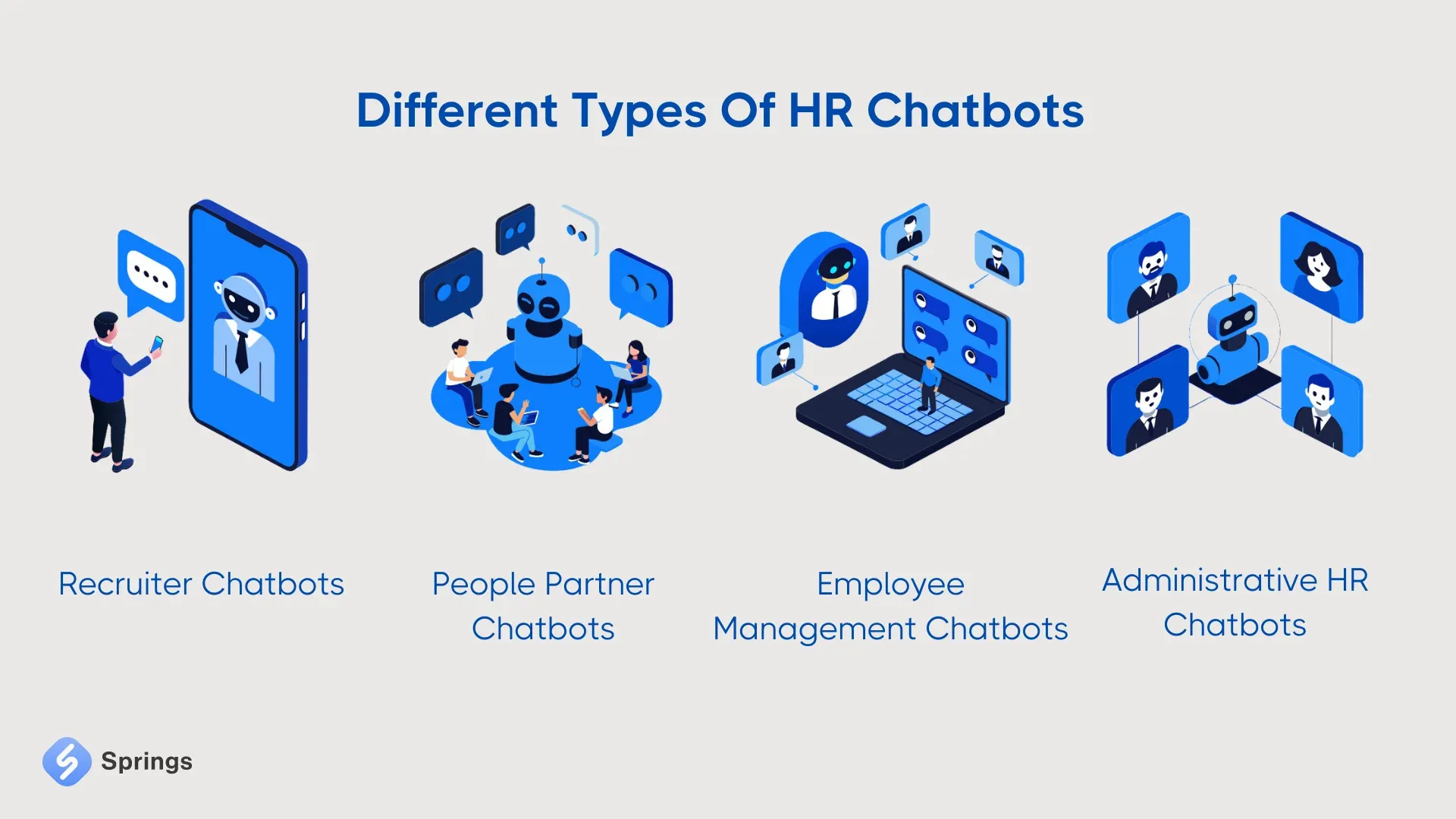
This dataset acts as the chatbot's brain, enabling it to answer questions, gather details, and guide candidates seamlessly. Let’s break it down.
What is a Dataset for HR Chatbots?
An HR chatbot questions and answers dataset is a collection of predefined questions and responses. It includes common queries candidates ask and the information HR teams need during recruitment and onboarding.
HR chatbot questions and answers dataset covers areas like:
- Role-specific queries.
- Company policies.
- Onboarding requirements.
This is how the HR chatbot questions and answers dataset ensures the chatbot communicates clearly and consistently.
A robust dataset improves the candidate experience. It ensures the chatbot has all the details needed to guide new hires.
Handling HR chatbot questions accurately reduces manual back-and-forth and speeds up onboarding. It also minimizes errors. Candidates get reliable information, and HR teams save time for more critical tasks.
Tips for Creating a Strong HR Chatbot Questions And Answers Dataset
The tips for creating an HR chatbot questions and answers dataset are the following:
- Analyze FAQs: Review common recruitment chatbot questions from candidates. Use this data to cover the basics.
- Integrate Company Policies: Add onboarding steps, benefits, and compliance information.
- Keep It Updated: Regularly review and refine the dataset as roles or processes change.
A strong HR chatbot questions and answers dataset ensures candidates feel supported and HR processes run smoothly. It’s a simple yet critical tool for effective recruitment and onboarding.
10 Essential HR Chatbot Questions for Pre-Screening and Onboarding
HR chatbots have revolutionized the hiring and onboarding process by automating repetitive tasks and improving communication. However, their effectiveness depends on the quality of the questions they ask.
This section dives deeper into ten essential HR chatbot questions for pre-screening and onboarding, explaining their significance and how they streamline the process.
1. Can you Tell me your Full Name and Contact Information?
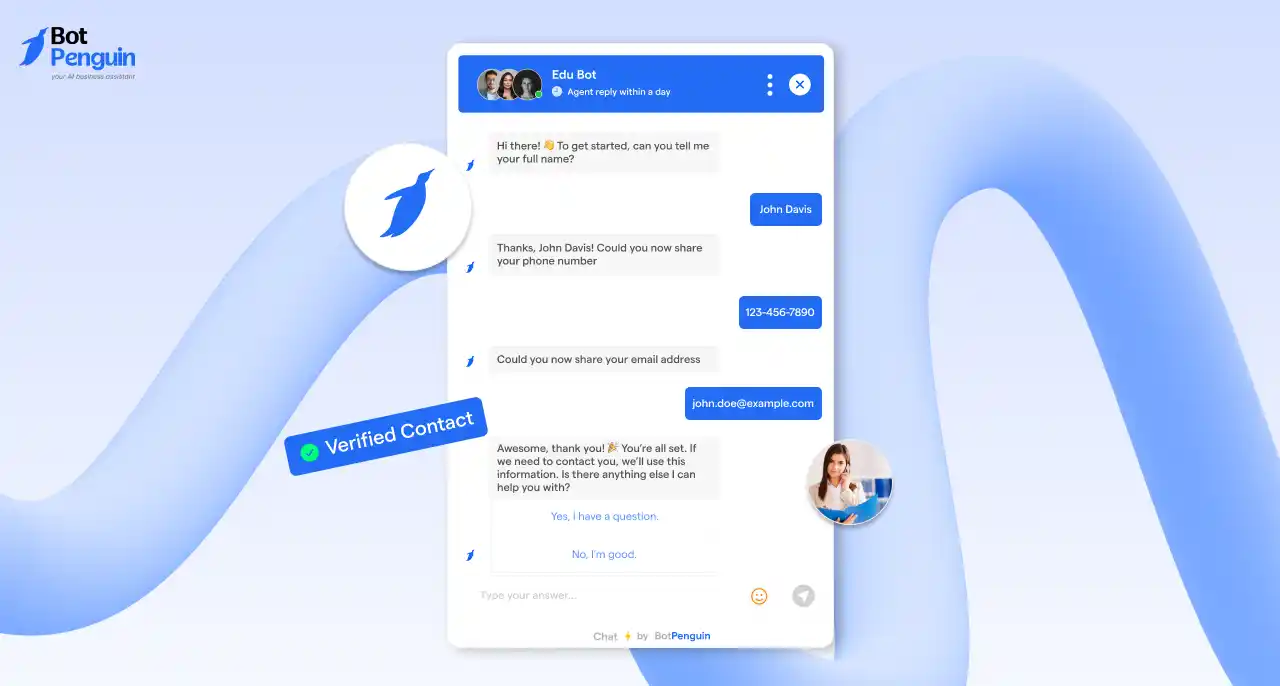
These simple recruitment chatbot questions is fundamental to starting the recruitment journey. A chatbot can collect and validate the candidate’s full name, email, phone number, and even LinkedIn profile or portfolio links.
This HR chatbot questions is critical for the following reasons:
- Accurate record-keeping is vital for tracking applications.
- It sets the foundation for seamless communication throughout the process.
Chatbots can also use this information to personalize future interactions, making candidates feel valued rather than treated like a number.
2. Which Position are you Applying for?
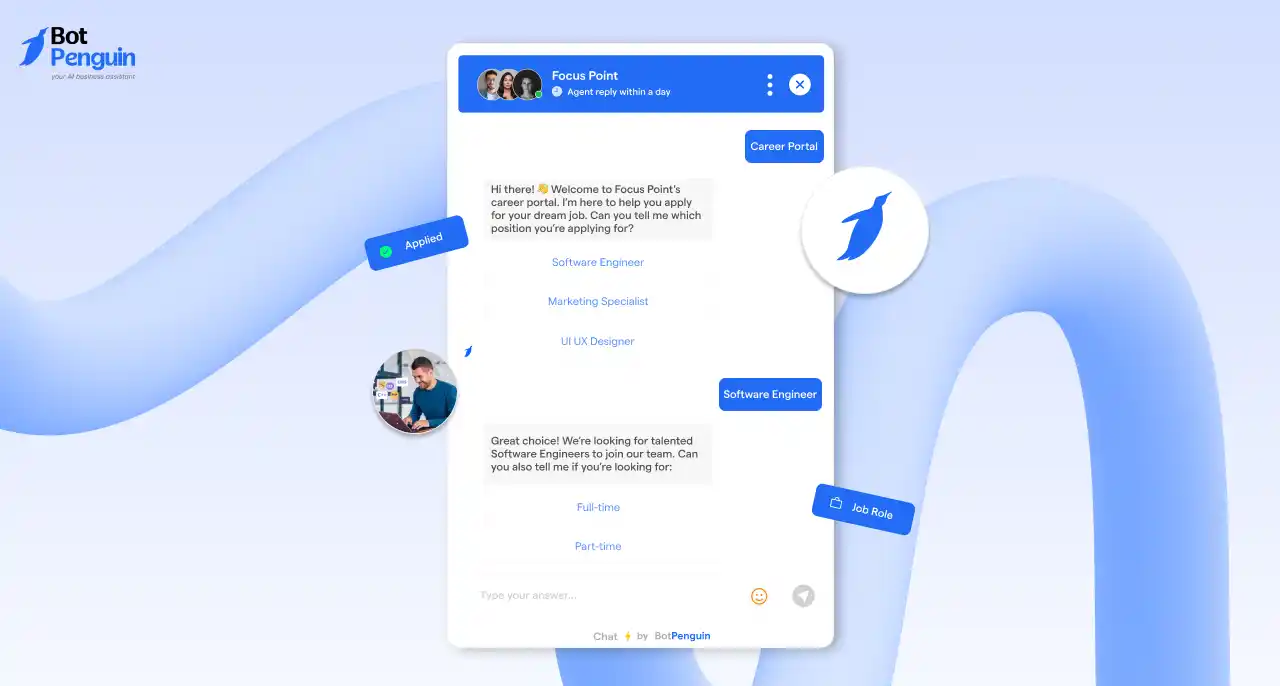
Candidates often apply to multiple roles, making this question essential for clarity. By confirming the position, the chatbot ensures subsequent questions and details are relevant to the specific job.
This recruitment chatbot questions is beneficial for the following reasons:
- Candidates receive job-specific details (e.g., work hours, and responsibilities).
- HR teams can track interest levels for different positions.
Advanced chatbots can cross-reference the position with job descriptions and provide tailored follow-up questions, such as asking about managerial experience for leadership roles.
3. Do you Meet the Required Qualifications for this Role? (e.g., degree, certifications, experience)
This recruitment chatbot questions serve as an initial filter, saving HR teams from manually reviewing unsuitable candidates.
It allows the chatbot to confirm whether the candidate meets basic qualifications, such as required degrees, years of experience, or certifications.
This HR chatbot questions matters for the following reasons:
- Helps prioritize qualified applicants.
- Reduces time wasted on unqualified candidates.
For example, if a role requires a professional license (e.g., CPA for accounting), the chatbot can flag candidates who lack it, ensuring only eligible applications move forward.
4. Are you Legally Eligible to Work in this Country?
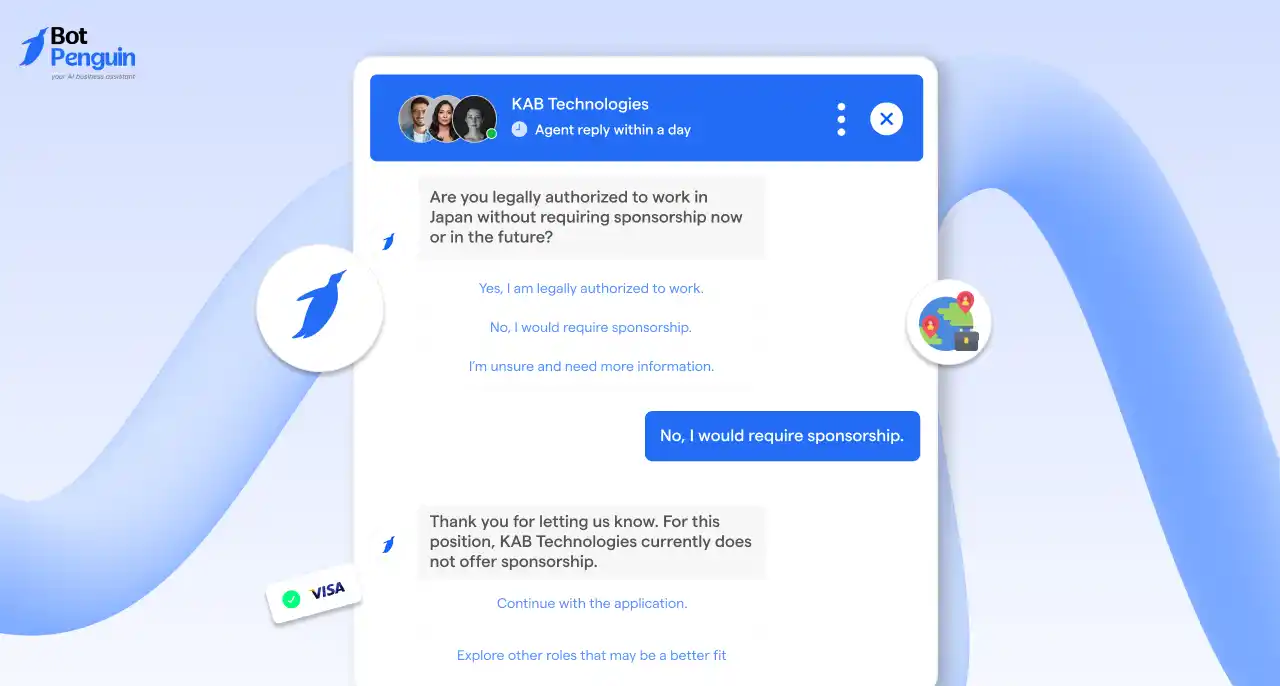
Work eligibility is a legal necessity. By asking this question upfront, the chatbot ensures compliance with local labor laws and avoids later complications.
This recruitment chatbot questions matter for the following reasons:
- Verifies eligibility quickly and efficiently.
- Filters out candidates who don’t meet legal requirements.
For multinational companies, chatbots can also clarify whether the company sponsors work visas, helping candidates understand their options.
5. Do you have the Availability to Start on [Specific Date]?
This recruitment chatbot questions help HR teams match timelines between candidates and hiring needs. Knowing a candidate’s availability allows companies to plan onboarding schedules more effectively.
This HR chatbot questions is helpful for the following reasons:
- Identifies candidates ready for immediate start.
- Allows HR to assess flexibility for urgent roles.
The chatbot can also follow up with questions like, “Do you have a notice period with your current employer?” to gather more specific information.
6. What is your Expected Salary Range?
Salary discussions can often be a source of misalignment between candidates and employers. Asking about expectations early on avoids wasted time and ensures both parties are on the same page.
This recruitment chatbot questions is important for the following reasons:
- Prevents mismatched expectations.
- Ensures transparency in compensation discussions.
Chatbots can also provide salary benchmarks for roles, helping candidates understand the company’s range and adjust their expectations accordingly.
7. Can you Provide a Brief Introduction about Yourself?
This open-ended HR chatbot questions allow candidates to summarize their professional journey, skills, and aspirations. It’s an excellent opportunity for candidates to showcase their personality and fit for the role.
This HR chatbot questions is valuable for the following reasons:
- Gives HR insights into the candidate’s communication skills.
- Helps HR teams understand the candidate’s priorities and goals.
Chatbots can analyze these responses to identify key skills or experiences, providing HR teams with a concise summary before interviews.
8. Have you Completed the Required Onboarding Paperwork?
Onboarding paperwork is a vital part of bringing a new hire on board. By asking this question, the chatbot tracks progress and ensures all necessary documents are submitted.
This recruitment chatbot questions is beneficial for the following reasons:
- Reduces delays caused by incomplete paperwork.
- Automates reminders for pending tasks.
For example, chatbots can guide candidates to upload identification documents, complete tax forms, or sign employment contracts. This minimizes administrative burdens for HR teams.
9. What Equipment or Software do you Need to Start?
For roles that involve remote work or specialized tools, this question ensures that new hires are equipped with everything they need from day one.
This HR chatbot questions is important for the following reasons:
- Reduces downtime caused by missing resources.
- Helps IT teams prepare in advance.
A chatbot can also provide candidates with a checklist of standard equipment or software, such as laptops, monitors, or project management tools, making the process smoother.
10. Do you have any Questions about your Role or the Company?
This HR chatbot questions promote open communication and ensure that candidates feel confident and informed about their new role. It allows them to clarify expectations, ask about company culture, or understand the next steps.
This recruitment chatbot questions adds value for the following reasons: How it adds value:
- Builds trust and transparency.
- Identifies any concerns candidates may have early on.
Chatbots can either answer FAQs directly or forward more complex queries to HR teams, ensuring candidates receive accurate information.
How Chatbots Use These HR Chatbot Questions
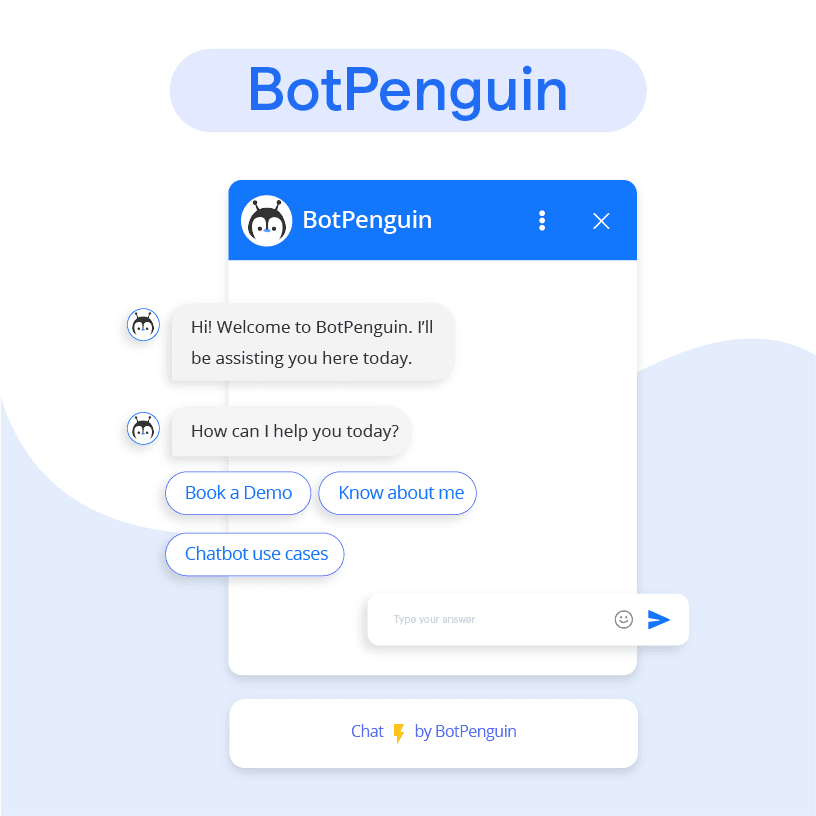
By integrating these ten HR chatbot questions, companies can build a comprehensive HR chatbot questions and answers dataset.
This dataset becomes the foundation for consistent and reliable interactions, ensuring that even common recruitment chatbot questions are handled efficiently.
Why it works:
- Automates repetitive tasks, freeing up HR teams.
- Improves candidate experience by offering quick and accurate responses.
- Reduces bottlenecks in the hiring process.
A well-crafted dataset allows chatbots to screen candidates effectively, assist during onboarding, and handle FAQs seamlessly. When implemented correctly, these questions ensure a streamlined process from application to day one.
Conclusion
In conclusion, integrate these 10 essential HR chatbot questions into your recruitment and onboarding processes. It can significantly improve efficiency, accuracy, and candidate experience.
By leveraging a robust HR chatbot questions and answers dataset, businesses can address common recruitment queries, and streamline pre-screening. It can guide new hires effectively through onboarding steps.
A well-structured HR chatbot questions and answers dataset ensures consistency and clarity. It addresses common recruitment chatbot questions effectively.
HR chatbot questions save time for both candidates and HR teams by automating routine tasks like pre-screening and paperwork. A well-designed chatbot, like BotPenguin, ensures seamless communication and minimizes errors.
BotPenguin is an advanced AI-powered chatbot platform that excels in automating recruitment and onboarding processes with precision. Known for its user-friendly interface and robust features, BotPenguin allows businesses to craft tailored HR chatbot questions to enhance candidate screening and onboarding efficiency.
It supports seamless integration of questions for qualifications, work eligibility, and onboarding tasks into an intuitive chatbot workflow.
Ultimately, these recruitment chatbot questions create a smoother hiring journey while delivering a positive experience for every candidate.
Frequently Asked Questions (FAQs)
What are the benefits of using HR chatbot questions for employee screening?
HR chatbot questions and answers dataset save time and ensure consistent communication. This recruitment chatbot questions streamline the hiring process by automating repetitive tasks like pre-screening, paperwork reminders, and answering candidate FAQs.
How do HR chatbot questions improve onboarding?
HR chatbot questions guide candidates through onboarding by tracking paperwork, clarifying job expectations, and identifying equipment needs. The HR chatbot questions and answers dataset ensures a smoother transition for new hires.
What is an HR chatbot questions and answers dataset?
R chatbot questions and answers dataset is a structured collection of predefined questions and responses used by chatbots to handle candidate interactions efficiently, from screening to onboarding.
Can HR chatbots personalize the hiring process?
Yes, HR chatbots tailor recruitment chatbot questions based on job roles, qualifications, and timelines, offering candidates a personalized and relevant experience.
How do HR chatbots handle recruitment chatbot questions?
HR chatbot questions address common recruitment queries about job roles, application status, and interview processes. Recruitment chatbot questions using their pre-designed dataset, ensuring quick and accurate responses.
Why is salary expectation one of the key HR chatbot questions?
Salary expectation HR chatbot questions help align candidate expectations with the company’s budget. These kinds of recruitment chatbot questions avoid mismatches and save time during negotiations.



